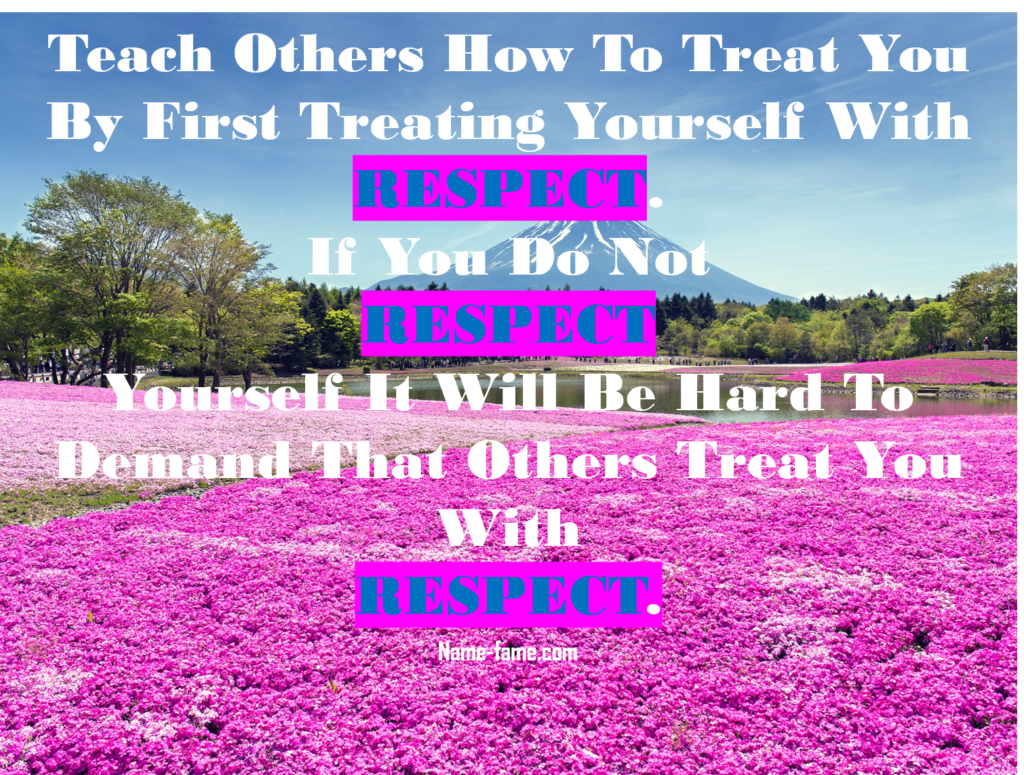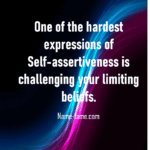The American Psychological Association defines self-respect as a healthy regard for one’s ideals, dignity, and character. It serves as a gauge of your worth.
“Don’t expect respect from others, until you learn to respect yourself first.”
According to Judith Zackson, PhD, the founder and clinical director of Zackson Psychology Group, self-respect necessitates a recognition of your unique identity, which in turn affects your beliefs, values, emotions, commitments, and behaviors.

This article discusses the value of respecting yourself and offers some tips for enhancing your self-respect.
SEE ALSO: How to Become the Greatest Version of Yourself: 10 Steps
The positive aspects of Self-Respect
• Internal sense of happiness:
People who respect themselves are aware that in order to find their worth, esteem, and pleasure, they must first search within. Because of this, their lives are more secure and satisfying than those of those who base their self-worth on what others think of them or on outside validation.
• Dedication to sustaining personal principles:
People who respect themselves have a set of standards and values that they use to judge their behavior.2 Since their own self-worth and feeling of self-worth depend on adhering to these rules of behavior, they are frequently willing to stake everything on doing so.
• Boundary-setting skills:
In order to have self-respect, a person must possess the courage to set boundaries and stand up for them when they are in danger. The ability to command the respect of others comes from respecting oneself enough to stand up for one’s values and personal boundaries. • Strong sense of dignity: Respecting oneself entails holding one’s person and position in high regard and upholding it at all times.
SEE ALSO: Love Yourself – The Importance And Benefits Of Self-Love
Potential The negative effects of Low Self-Respect
• Relying on outside validation:
People with poor self-respect let other people define them instead of defining themselves. They frequently lead phony lives because they care more about how others view them than about what matters to them. They frequently seek approval from others and have a tendency to be people pleasers.
• Leading a meaningless life:
Those who lack self-respect aren’t concerned with their core principles or the significance of their existence. They frequently act rashly, recklessly, depend on others, and self-destructively.
• Having a poor opinion of oneself:
People who lack self-respect are more likely to have a poor opinion of themselves, which can lead them to engage in self-defeating behaviors like negative self-talk.
SEE ALSO: How to Maintain Your Positive Attitude When Everyone Else Is Negative
• Forming unhealthy connections:
Healthy relationships require a healthy dose of self-respect as well as a balanced, wholesome image of oneself. Without it, people struggle to uphold their limits and speak out for themselves. People who lack self-respect frequently find themselves trapped in unfavorable circumstances, such as controlling or abusive relationships, over time.
Factors Affecting Self-Respect
Earlier influences
Like any other enduring characteristic, self-respect mostly develops during childhood. When their parent or caregiver loves and values them for who they are, children learn that it is okay for them to love themselves.
The first step in teaching a youngster to esteem oneself is to love and care for them unconditionally. They will be considerably less inclined to impose artificial restrictions on such feelings for themselves if they are aware that they do not need to perform any special actions in order to deserve love and respect.
SEE ALSO: Why You Should Stop Chasing Other People And Instead Put Your Attention On Yourself
Parents are more likely to instill these ideals in their children if they esteem themselves and are content with who they are. A child’s feeling of worth is more likely to be shaped by who parents already are than by what they do. Self-respect is instilled in children at a young age and is a lifelong virtue.
Influences of adults
While variables from one’s upbringing frequently have a much greater impact on one’s sense of self-respect, impacts from adulthood also contribute. A person’s perception of self-efficacy and self-confidence can be influenced by elements such as relationships, employment, and life experiences.
How to Boost Your Own Respect
Since how you see yourself affects all aspect of your life, including your relationships, career, and social life, self-respect is a crucial component of identity. The first step in earning the respect and love of others is to first learn to appreciate and love yourself.
SEE ALSO: Why Emotional Intelligence Matters and How to Develop It
There are actions you may take to improve your low level of self-respect. A mental health professional can assist you in identifying your values, changing unhelpful thought patterns, establishing clear boundaries, and developing self-love.
• Define your values:
Begin by getting to know yourself. Imagine being suddenly stripped of all you own and having nothing left except yourself. What is important to you, consider. What values do I hold? Why do I accept less? What could make me remember my worth?
• Keep your attention on your inner qualities:
Avoid falling into the trap of believing that your value as a person is determined by things like your net worth, title, appearance, belongings, or the number of followers you have on social media. However, self-respect is about internal traits like your morals, ideals, and behavior.
• Practice self-acceptance:
Start observing your mental processes without becoming sucked into them. Focus on accepting who you are and let go of your harsh inner critic. Decide to forgive yourself and accept all of your flaws, poor habits, and other aspects of yourself that you don’t like.
SEE ALSO: How to Deal with Those Who Make You Feel Inferior
• Discourage unfavorable thoughts:
Be mindful of how your negative thought patterns influence your behavior. Recognize what makes you think negatively and rationalize such beliefs. For instance, it can be useful to acknowledge this thought process and confront it: “Even if I’m not great at singing, I am still worthy of love and respect.” This can assist if a bad experience or a lack of particular talents causes you to instantly judge oneself as worthless.
Resist the urge to give in to self-doubt by working to break its hold. If you don’t want someone to treat you disrespectfully, then don’t let them. Create a relationship with yourself and become aware of your qualities and principles. Remind yourself that we have a moral duty to respect ourselves just as much as we have a duty to respect others.
Conclusion
No matter what you do or don’t do, you are always beautiful and deserving of self-respect. Whenever you feel your inner critic starting to flare up, take a moment to halt, confront your ideas as they whisper in your ear, and remind yourself of this.
BEST BOOK – The Magic of Self-Respect: Awakening to your Own Awareness






